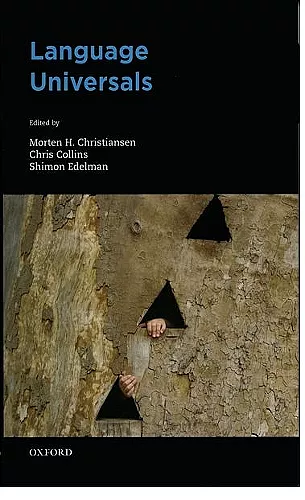Language Universals
Morten H Christiansen author Christopher Collins author Shimon Edelman author
Format:Hardback
Publisher:Oxford University Press Inc
Published:26th Mar '09
Currently unavailable, and unfortunately no date known when it will be back

Languages differ from one another in bewildering and seemingly arbitrary ways. For example, in English, the verb precedes the direct object ('understand the proof'), but in Japanese, the direct object comes first. In some languages, such as Mohawk, it is not even possible to establish a basic word order. Nonetheless, languages do share certain regularities in how they are structured and used. The exact nature and extent of these "language universals" has been the focus of much research and is one of the central explanatory goals in the language sciences. During the past 50 years, there has been tremendous progress, a few major conceptual revolutions, and even the emergence of entirely new fields. The wealth of findings and theories offered by the various language-science disciplines has made it more important than ever to work toward an integrated understanding of the nature of human language universals. This book is the first to examine language universals from a cross-disciplinary perspective. It provides new insights into long standing questions such as: What exactly defines the human capacity for language? Are there universal properties of human languages and, if so, what are they? Can all language universals be explained in the same way, or do some universals require different kinds of explanations from others? Language Universals is unique in starting with the assumption that the best way to approach these and related questions is through a dialogue between a wide range of disciplines, including linguistics, cognitive neuroscience, philosophy, computer science and biology.
"This is an impressive collection of work on Universals of Language as seen from a wide spectrum of disciplinary perspectives. It will surely play a significant role in the re-orientation of such research from the mere accumulation of cross-linguistic regularities to the search for the organizing principles of human cognition that give rise to those regularities. The breadth and depth of the studies here show that Universals research is finally moving toward a genuinely scientific status."-Stephen R. Anderson, Dorothy R. Diebold Professor of Linguistics and Professor of Psychology and Cognitive Science, Yale University "Despite enormous diversity, there are striking similarities across languages. Why do languages take the forms they do, and only those forms? This question has long been both a puzzle and the source of enormous controversy. Is it just coincidence? Is there something about the shared human experience? Or the biology common to our species? Is there some internal logic to language that makes only some languages viable? These are enormously challenging questions. This collection, by some of the most prominent scholars in the field, presents a rich and diverse set of possibilities. This is a fascinating and an important book, and significantly advances our progress toward understanding why only our species has language."-Jeffrey L. Elman, Dean, Division of Social Sciences, University of California, San Diego
ISBN: 9780195305432
Dimensions: 155mm x 236mm x 25mm
Weight: 570g
312 pages